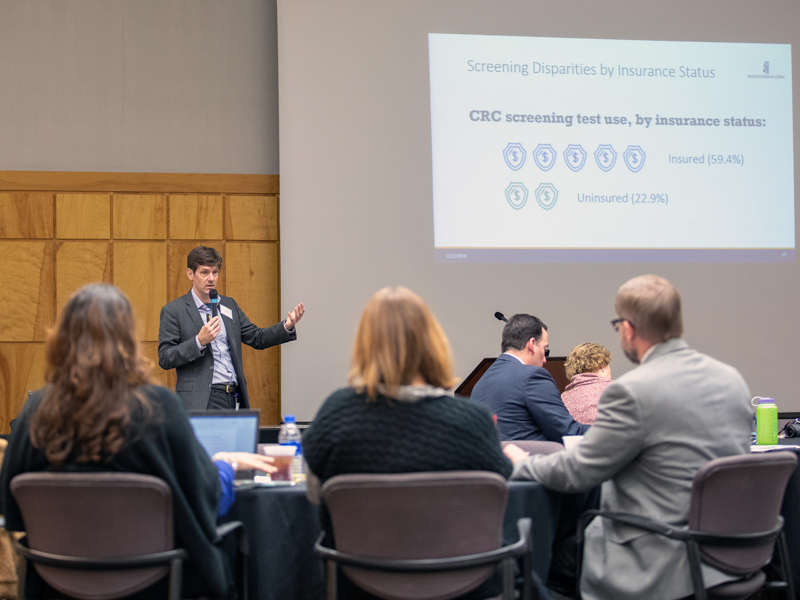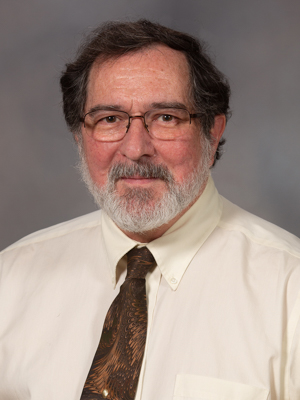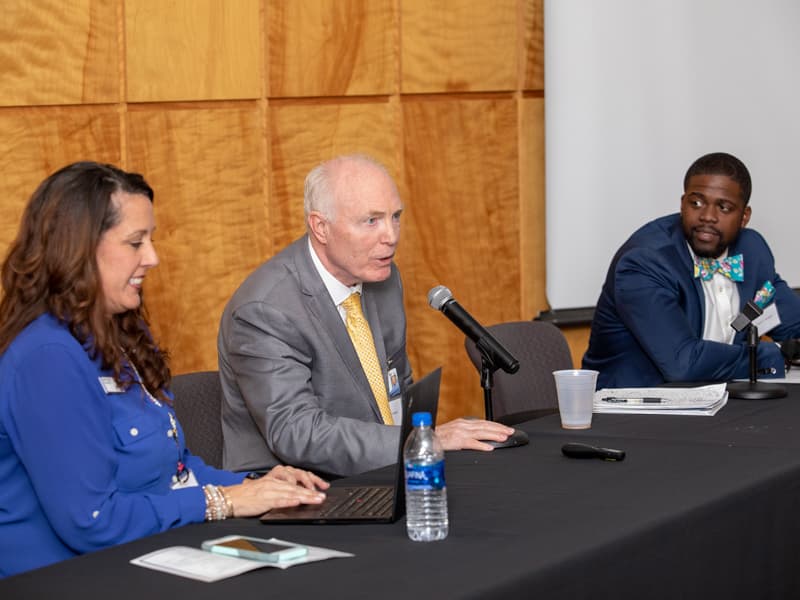Efforts to increase colorectal cancer screening in MS yield positive results

Mississippi’s 70x2020 Colorectal Cancer Screening Initiative enters its final year of efforts to increase screening as a way to lower colorectal cancer deaths while planning how to continue and sustain those efforts.
After six years of grassroots, largely volunteer efforts, the 670-plus member group has seen screening numbers increase and deaths decline.

“Every metric has improved and I hope they will continue to improve,” Dr. Roy Duhe, professor of pharmacology and toxicology and one of the Initiative’s founders, said at the recent 70x2020 annual conference at the University of Mississippi Medical Center.
Duhe presented figures that showed in the Initiative’s six years of work, the number of Mississippians diagnosed with colorectal cancer and the number who die of it have decreased and the number who report they’ve been screened has increased.
“We’ve seen improvements in every measure and disparities between blacks and whites decreased in all three measurements,” said Duhe, a member of the UMMC Cancer Center and Research Institute’s Cancer Control, Epidemiology and Disparities Research Program.
The Initiative used figures for incidence and mortality from the Mississippi Cancer Registry with 2006-2010 as a base and compared them to 2016, the latest year for which verified figures are available. It used figures from the Behavioral Risk Factor Surveillance System survey, administered by the Centers for Disease Control and Prevention, to measure screening. The numbers show:
- Incidence of colon cancer per 100,000 people dropped from 54.49 to 46.35 with the gap between white and blacks dropping from 14.4 to 11.51.
- Mortality per 100,000 people dropped from 19.79 to 18.65, with the gap between whites and blacks narrowing from 8.8 to 5.36.
- Screening increasing from 55.3 percent of the population surveyed to 63.8 percent.
Closing the racial gap is one crucial element to lowering overall deaths from cancer, said Dr. Thomas Dobbs, state health officer with the Mississippi State Department of Health. “We know blacks are less likely to survive cancer,” he said. Lack of screening is one reason.
Phillips Strickland, senior attorney in the Mississippi Insurance Department’s Legal Division, said roadblocks to screening for all races include cost, the stigma and the time and effort required.

And, while several stool-based tests and colonoscopies are covered by insurance, some newer ones that test DNA may not be covered by all types of insurance, he said. Mississippi has an uninsured rate of 18 percent.
Other factors that influence people to be screened are having a personal physician and being educated about screening, Dobbs said. Changing perceptions also is key, he said. “In Mississippi, we have a culture of illness not a culture of wellness.”
The Initiative’s efforts largely are aimed at wellness. Members have sought to educate communities about the ability of colonoscopies to allow the removal of polyps before they’re malignant and the ability of stool testing to help detect colorectal cancer earlier when treatment is more successful.
While the Initiative hasn’t met its 70 percent goal and may not in the one year remaining in its effort, the improvement means lives were saved and many who were screened now are screening advocates.
Duhe listed some of the milestones for the Initiative:
- Securing a Patient-Centered Outcomes Research Institute award to intensely focus education efforts in the Mississippi Delta where incidence and deaths were highest. The 2-year award helped community advocates reach hundreds with the screening message. Some continued after the award ended.
- Attaining a colorectal cancer screening car tag with proceeds going into a fund to promote further screening.
- Enlisting Dallas Cowboys quarterback Dak Prescott to film public service announcements promoting screening. His mother died of the cancer.
- Members who created fundraising efforts for the fund, such as the Butts and Guts 5K organized and promoted by GI Associates in Jackson.
- Awareness events throughout the state, with large ones in Tupelo, Greenville and Biloxi.
- Community engagement. “This has been our most outstanding success,” Duhe said.
- Growth in membership from 15 groups and individuals when it started in 2014 to more than 670 today.
Mississippi created a unique model that called on grassroots efforts to promote screening.
“We’ve had much more innovation because people didn’t have to ask someone if an activity was OK,” Duhe said. “The mission of creativity we think about in the arts community came to fruition in this. We didn’t just copy others.”
Next, members said, are efforts to maintain the screening focus in 2020 and transition to a state Colorectal Cancer Roundtable. Roundtables are part of a national American Cancer Society effort to promote colorectal cancer prevention and early detection. UMMC CCRI is designated to lead the state roundtable.
Other ideas, birthed in the Initiative, include:
- UMMC students who are working on a pilot project to offer colorectal screening to uninsured through the Jackson Free Clinic, one medical and pharmacy students operate with help from attending physicians.
- Finding better ways to link those in rural areas whose stool-based test indicate they need a colonoscopy to a center that can provide it.
- Eliminate the delay between diagnosis and treatment, especially for those in rural areas.
- Identify those at higher risk, perhaps by creating a Lynch Registry so those with the syndrome know they should be screened earlier for colorectal and ovarian cancers.
Do you need to be screened?
National guidelines recommend each adult be screened for colorectal cancer beginning at age 50 with recurring screens at intervals their doctor recommends. Generally those with a clear screening would be screened again in 10 years.
Those with a family history of colorectal cancer, African Americans and Jews of Eastern European descent have a higher rate of colorectal cancer and should discuss the age at which they should begin screening with their doctor.


